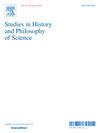Does diversity promote exclusion?
IF 1.8
2区 哲学
Q1 HISTORY & PHILOSOPHY OF SCIENCE
引用次数: 0
Abstract
We argue that the typical meanings and operationalizations of diversity are practically linked to dichotomy and hamper equity practices in the academia. Scientists and scholars in mainstream Western society widely agree that achieving social justice requires promoting diversity in science and society. Diversity refers to differences existing in a set of entities, and ‘human diversity’ in academic research and social practice typically refers to racial, ethnic or gender differences in designated groups. Diversity is expected to promote inclusion by recognizing these differences and demanding equal representation in science and society. However, we argue that the operationalization of ‘diversity’ is actually disposed to produce dichotomy, thus often ending in a stereotypic portrayal of underrepresented groups rather than promoting their inclusion. We describe the informal and formal meanings of diversity measures and their usage in an academic course devoted to equity in education. We explain – at least partly – why this discourse tends to dichotomize a complex social phenomenon, inadvertently exacerbating the challenges faced by underrepresented groups. To conclude: promoting social justice requires inclusion; inclusion requires diversity, yet the implementation of a particular set of practices of diversity leads to a dichotomy that increases divergence, distancing us from inclusion. Thus, current practices of ‘diversity’ may actually undercut rather than encourage the reduction of social injustice.
多样性促进排斥吗?
我们认为,多样性的典型含义和操作方式实际上与二分法联系在一起,阻碍了学术界的公平实践。西方主流社会的科学家和学者普遍认为,实现社会公正需要促进科学和社会的多样性。多样性是指存在于一系列实体中的差异,而学术研究和社会实践中的“人类多样性”通常是指指定群体中的种族、民族或性别差异。通过承认这些差异并要求科学和社会中的平等代表权,多样性有望促进包容。然而,我们认为,“多样性”的操作化实际上倾向于产生二分法,因此往往以对代表性不足的群体的刻板描绘而不是促进他们的包容而告终。我们描述了多样性措施的非正式和正式含义,以及它们在致力于教育公平的学术课程中的使用。我们解释-至少部分-为什么这种话语倾向于将复杂的社会现象一分为二,无意中加剧了未被充分代表的群体所面临的挑战。总而言之:促进社会正义需要包容;包容需要多样性,但实施一套特定的多样性实践会导致两极分化,增加分歧,使我们远离包容。因此,目前的“多样性”做法实际上可能会削弱而不是鼓励减少社会不公正。
本文章由计算机程序翻译,如有差异,请以英文原文为准。
求助全文
约1分钟内获得全文
求助全文
来源期刊

Studies in History and Philosophy of Science
管理科学-科学史与科学哲学
CiteScore
2.50
自引率
10.00%
发文量
166
审稿时长
6.6 weeks
期刊介绍:
Studies in History and Philosophy of Science is devoted to the integrated study of the history, philosophy and sociology of the sciences. The editors encourage contributions both in the long-established areas of the history of the sciences and the philosophy of the sciences and in the topical areas of historiography of the sciences, the sciences in relation to gender, culture and society and the sciences in relation to arts. The Journal is international in scope and content and publishes papers from a wide range of countries and cultural traditions.
 求助内容:
求助内容: 应助结果提醒方式:
应助结果提醒方式:


